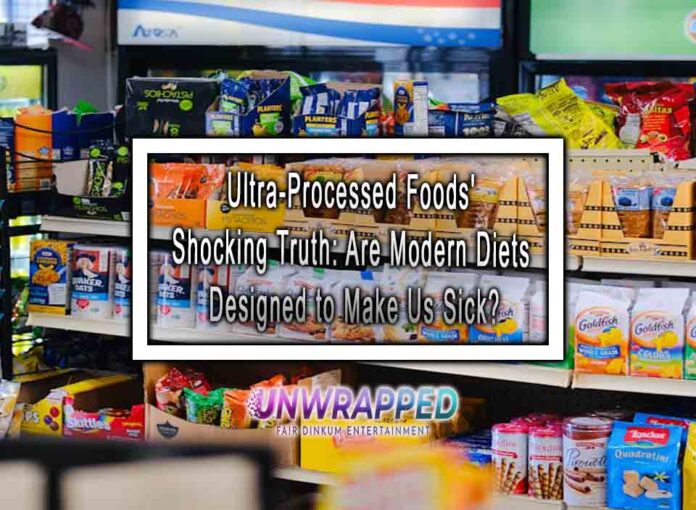Introduction
In today’s fast-paced world, convenience often takes precedence over health. Ultra-processed foods dominate supermarket shelves, offering quick meals at the expense of nutrition. These foods, packed with artificial additives, preservatives, and excessive sugars, have become dietary staples for millions. But are they doing more harm than good? Emerging research suggests that ultra-processed foods are not only contributing to chronic illnesses like obesity, diabetes, and heart disease but are also fueling profits for both the food and pharmaceutical industries.
This article explores the growing connection between ultra-processed diets and chronic health conditions, questioning whether the promotion of such foods is a deliberate strategy to create a cycle of dependency on medications. As we dig deeper, we’ll investigate the role of the food industry, the potential conflicts of interest with pharmaceutical companies, and what this means for public health.
Ultra-Processed Foods: A Silent Epidemic
What Are Ultra-Processed Foods?
Ultra-processed foods (UPFs) are industrially manufactured products made primarily from refined ingredients, artificial additives, and minimal whole food components. Examples include:
- Sugary cereals and breakfast bars
- Packaged snacks like chips and cookies
- Fast food meals
- Soft drinks and energy beverages
- Frozen dinners and instant noodles
While these products are engineered to taste great and last longer on shelves, they lack the essential nutrients found in minimally processed or whole foods.
The Health Consequences of Ultra-Processed Diets
Numerous studies have linked the consumption of ultra-processed foods to a range of chronic health conditions, including:
- Obesity: High calorie density, combined with low nutritional value, contributes to weight gain.
- Type 2 Diabetes: Refined sugars and carbohydrates spike blood sugar levels, increasing insulin resistance over time.
- Cardiovascular Diseases: Trans fats and excessive sodium in UPFs elevate risks of hypertension, heart attacks, and strokes.
- Mental Health Issues: Emerging evidence connects diets rich in UPFs with depression and anxiety, likely due to nutritional deficiencies and gut health imbalances.
Profiting from Poor Health: The Food-Pharma Connection
Food Industry Practices
The food industry relies heavily on marketing ultra-processed foods as affordable and convenient options. By targeting vulnerable populations—including low-income families and children—they create lifelong customers addicted to high-sugar, high-fat products.
- Aggressive Advertising: Billions are spent annually on marketing junk food to children.
- Misleading Labels: Claims like “low-fat” or “natural” often disguise products loaded with harmful additives or excessive sugar.
- Supply Chain Dominance: Mega-corporations monopolize production and distribution, making healthier alternatives less accessible and affordable.
The Pharmaceutical Industry’s Stake
As ultra-processed diets drive chronic illnesses, the pharmaceutical industry stands to gain from increased demand for medications. Common examples include:
- Diabetes: Rising cases mean booming sales for insulin and oral medications like metformin.
- Cardiovascular Drugs: Statins and blood pressure medications are among the most prescribed globally.
- Digestive Aids: Poor diets contribute to gastrointestinal disorders, increasing the need for antacids and laxatives.
The question arises: Is there a deliberate strategy between these industries to perpetuate unhealthy eating habits, ensuring long-term profits from the resulting health issues?
Are We Being Manipulated?
Conflicts of Interest in Health Guidelines
Many national health organizations receive funding from food and pharmaceutical corporations, raising concerns about biased dietary recommendations. For instance:
- Partnerships between fast-food chains and health institutions undermine public trust in dietary guidelines.
- Processed food companies sponsor studies to downplay the health risks of their products.
- The revolving door between corporate executives and regulatory agencies creates potential conflicts of interest.
Addiction by Design
Ultra-processed foods are engineered to be hyper-palatable, combining sugar, fat, and salt in ways that trigger dopamine release in the brain. This creates addictive eating patterns, much like drugs. Over time, these foods lead to overconsumption and dependency, locking consumers into a vicious cycle of poor health.
Real-Life Impact: The Rise of Chronic Illness
A Case Study in Numbers
According to the World Health Organization (WHO):
- Chronic illnesses account for 71% of global deaths annually.
- Obesity rates have tripled since 1975, coinciding with the rise of processed foods.
- Nearly 1 in 10 adults worldwide now has diabetes, with Type 2 diabetes being the most common.
Individual Stories
Take Jane, a 42-year-old office worker who relies on packaged meals due to her busy schedule. Over the years, she developed obesity, Type 2 diabetes, and high blood pressure. Despite taking multiple medications, her health continues to deteriorate. Jane represents millions whose lives are negatively impacted by dietary choices driven by convenience and corporate influence.
Is Change Possible?
Policy Changes
To break the cycle of poor health and corporate control, governments and regulatory bodies must take action:
- Stronger Labeling Laws: Clearer labels about sugar, fat, and sodium content are essential to empower consumers.
- Regulating Marketing to Children: Limiting junk food ads targeting young audiences could reduce lifelong unhealthy eating habits.
- Subsidizing Healthy Foods: Making fruits, vegetables, and whole grains more affordable would incentivize healthier choices.
Personal Choices
Consumers can also take steps to reclaim their health by:
- Avoiding processed foods whenever possible.
- Cooking at home using whole, unprocessed ingredients.
- Educating themselves on the long-term health impacts of dietary habits.
Conclusion
The rise of ultra-processed foods and their connection to chronic illnesses reveal a troubling dynamic between the food and pharmaceutical industries. These corporations profit from poor health, perpetuating a cycle that undermines public well-being. With billions at stake, challenging their dominance is no easy task, but it is essential for the future of global health.
The power to combat these trends lies in a combination of systemic change and individual action. Governments must enact stricter regulations to hold corporations accountable, while consumers must prioritize health-conscious choices. By breaking free from the grip of ultra-processed diets, we can begin to reverse the tide of chronic illness and create a healthier future for all.











